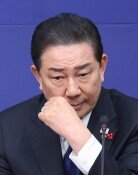AECF & Chairman¡¯s Statements
AECF & Chairman¡¯s Statements
Posted October. 21, 2000 20:38,
Asia-Europe Cooperation Framework
¢Ñ Full text
The third ASEM in Seoul adopted an Asia-Europe Cooperation Framework (AECF) to guide, focus and coordinate ASEM activities in the days to come. The AECF sets out the vision, principles, objectives, priorities and mechanisms for the ASEM process for the first decade of the new millennium.
The Asia-Europe Meeting was initiated with the aim of mutual cooperation between Asia and Europe in this area of growing global interdependence on an equal footing.
Asia and Europe as an area of peace and shared development with common interests and aspirations such as upholding the purposes and principles of the U.N. Charter, respect for democracy, the rule of law, equality, justice and human rights and concern for the environment.
ASEM partners also recognize the need to work together in addressing the new challenges posed by, among other things, globalization, information technology, e-commerce and the New Economy.
The key principle of ASEM is common interest and development of a common vision of the future. For this, ASEM will decided on the priorities for cooperation and deal with political, economic and cultural sectors on a basis of equal partnership. ASEM, as informal process, will not be institutionalized.
In the political field, ASEM will not exclude any issue beforehand but e wisdom and judiciousness in selecting the topics for discussion and will not intervene, whether direct or indirect, in each other¡¯s internal affairs.
In this context, high-level political dialogue will be intensified, including at senior officials meeting (SOM) to discuss U.N. reform, arms control, disarmament and non-proliferation of weapons of mass destruction; ASEM will intensify dialogue in Economic Ministers` Meeting and Senior Officials` Meeting on Trade and Investment (SOMTI), with particular regard to complementing and reinforcing efforts to strengthen the open and rules-based multilateral trading system embodied in the WTO.
Member countries will strengthen two-way trade and investment flows between Asia and Europe, notably through the active implementation and further enhancement of the Trade Facilitation and Investment Promotion Action Plans (TFAP and IPAP).
In the social, cultural and educational fields, ASEM partners should continue strong support and encouragement for Asia-Europe Foundation. Key priorities shall include enhancing our contacts and exchanges in the field of education, including student, academic and information exchanges, inter-university cooperation, facilitating electronic networking between schools, and sharing experiences in social, scientific, artistic and sports fields.
The ASEM process, which is open and evolutionary, is intended to reinforce the Asia-Europe partnership, and a final decision on new participants will be made by consensus among all partners only after a candidate has first got the support of its partners within its region.
Third ASEM Chairman¡¯s Statement
¢Ñ Full text
In the Third ASEM summit, leaders reaffirmed their commitment to strengthen the Asia-Europe partnership.
Leaders noted with particular satisfaction the clear signs of recovery in the Asian countries affected by the financial and economic crisis and recognized the importance of the continued reform in the light of specific situations in the countries concerned.
They expressed concern over volatility in oil prices and shared the view that ensuing a stable supply of energy, including oil and other fuels, was vital to the maintenance of long-term economic growth for all ASEM partners and the world at large.
Leaders also took note of the continued development of the ASEAN Regional Forum (ARF) as an important forum for dialogue and cooperation on regional, political and security issues and welcomed the admission of the Democratic People`s Republic of Korea (DPRK) in July 2000 as a significant step which has further strengthened the ARF and would help contribute to advancing the cause of regional peace and security.
Leaders welcomed the progress for the restoration of stability in East Timor and expressed concern over the latest Middle East conflict. They also underlined the importance of maintaining global strategic balance and stability, and strengthening regional and global initiatives on arms control, disarmament and non-proliferation of weapons of mass destruction.
Leaders expressed their commitment to addressing global issues of common concern such as managing migratory flows in a globalized world and transnational crime, including money laundering; smuggling and exploitation of migrants and trafficking in persons, in particular of women and children for the purpose of sexual exploitation to act as a catalyst for enhanced cooperation in the environmental field.
Leaders committed themselves to promoting greater economic linkages between ASEM partners as an indispensable element of a strong partnership between two regions.
In this age of knowledge, information and globalization, leaders recognized the importance of cooperation in the areas of information and communications technology as well as trade and investment.
Leaders reiterated the importance of a rules-based multilateral trading system in promoting global growth, prosperity and sustainable development and meeting the challenges of globalization.
Looking forward to meeting at ASEM Four in Copenhagen, Denmark in 2002, Leaders decided to hold the Fifth ASEM in Asia in 2004.



![보일러 풀가동해도 춥다?…난방비 폭탄 범인은 ‘이것’ [알쓸톡]](https://dimg.donga.com/c/138/175/90/1/wps/NEWS/IMAGE/2025/12/24/133029046.3.png)



